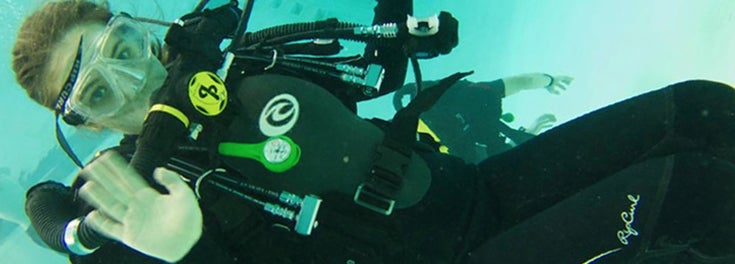
For a student growing up caring for show cows and chickens or navigating the concrete jungle of a major city, exploring undersea shipwrecks and poring over archival documents and maps in Europe might seem like a life too daring to dream.
But Morgan Breene ’14 did exactly that when she ventured beyond the fences of her family farm in West Greenwich, R.I., to enroll at the University of Rhode Island. Like many of the students in Kingston, Morgan made the most of her academic opportunities before graduating summa cum laude in May. She scuba dived to explore underwater archaeological sites in the Caribbean and Mediterranean seas, conducted archival research in London and made important archaeological discoveries as an undergraduate.
In doing so, Morgan accomplished something no URI student had achieved before by becoming the University’s first Marshall Scholar.
Though her body of work made Morgan an outstanding candidate for the Marshall Scholarship, the application process required more than just a strong resume, and the university’s Honors Program helped prepare her for the rigorous application process.
A self-described introvert, Morgan worked diligently, preparing for and practicing mock interviews with 10 professors to make sure she was ready to speak with the Marshall Scholar interview committee.
“I’m not the traditional Marshall Scholar candidate, so this is a huge honor. It was a major time commitment not only on my part, but on the part of the Honors Program as well,” Morgan said. “Knowing that they saw something in me and took this on to help me prepare, it feels good to make that effort pay off.”
Morgan, who majored in anthropology and history, is one of 31 winners of the award this year and the only recipient from a public institution in New England. The award provides Morgan with two years of funding to study in the United Kingdom, where she will pursue master’s degrees in maritime archaeology and European history.
The scholarship is so prestigious that students must be nominated by their institutions, ensuring that all applicants are among the highest achieving young scholars in the country.
“I was over the moon when they called me,” Morgan said. “I was jumping all over the living room.”
It was the culmination of years of hard work during which Morgan also trained to an advanced level as a scientific diver. Her first experience with underwater archaeology came with a group of URI students, under the direction of Associate Professor Bridget Buxton, who conducted excavations at the ancient port of Akko in Israel. Their efforts led to important new discoveries from the era of the Napoleonic wars.
Kathleen Maher, URI assistant director for national fellowships, said Morgan’s hard work is a great illustration of what can be achieved at a public university.
“Morgan is a shining example of our culture of achievement at the university,” Maher said. “She pursued a great range of academic opportunities available here, which helped her stand out among the best young scholars from around the nation.”
Morgan aspires to protect submerged cultural heritage sites by educating and engaging the public on the importance of underwater archaeology.
“I like people. I like to know why we do what we do, how we got to the present,” she said. “And I like to tell stories. What can a shipwreck tell you about the past? The major archaeological finds of the next 100 years are going to be found underwater.”
